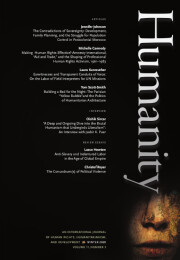HUMANITY, VOLUME 11, ISSUE 3
 Our new issue features a conversation between Jasbir K. Puar and Oishik Sircar, available open-access on the Humanity journal website. The issue also includes essays on the politics humanitarian architecture and the Parisian “Yellow Bubble,” family planning projects in postcolonial Morocco, how Amnesty International’s formative years shaped professional human rights activism, and the linguistic and affective labor of field interpreters for UN missions. It contains review essays on theories of political violence and on global histories of slavery and indentured labor.
Our new issue features a conversation between Jasbir K. Puar and Oishik Sircar, available open-access on the Humanity journal website. The issue also includes essays on the politics humanitarian architecture and the Parisian “Yellow Bubble,” family planning projects in postcolonial Morocco, how Amnesty International’s formative years shaped professional human rights activism, and the linguistic and affective labor of field interpreters for UN missions. It contains review essays on theories of political violence and on global histories of slavery and indentured labor.
TABLE OF CONTENTS
Abstract: This essay examines the origins of family planning programs in postcolonial Morocco and demonstrates a dynamic relationship between the Moroccan leadership, population experts, and global health programs. While introducing the initiative in Morocco, King Hassan II and the Population Council, the chief architect and supporter of population control efforts in the 1960s, negotiated, adapted, and balanced competing agendas in order to achieve their respective goals. The Moroccan case reveals innovative methods of state building but it also highlights how population control created contradictions of
Read More »
Abstract: This article takes Amnesty International’s “Aid and Trade” debate during the late 1970s and early 1980s as a window onto the ways that human rights activists thought about their work and how they understood their organization. It examines the way they grappled with their relationship in to expanding governmental action on human rights, and the meaning of the concepts “effectiveness” and “impartiality,” which were central to Amnesty’s founding.
Read More »
Abstract: This essay considers the labor of field interpreters who worked for the UN during two critical missions in Nepal—the UN High Commission of Human Rights (OHCHR) and the United Nations Mission in Nepal (UNMIN) during and after the Maoist civil war. Interpreters negotiate two different ethical stances that resonate with contrasting ethical approaches in human rights and humanitarian work. As conduits of voice, an interpreter seeks to be neutral and impartial, a non-autonomous figure of mediation within the work of human rights. Field interpreters
Read More »
Abstract: The past decade has seen the expansion of architecture with an explicitly humanitarian purpose. This article examines the politics and functions of this movement by looking in detail at the humanitarian center at Porte de la Chapelle in Paris (the “Yellow Bubble”). Based on in-depth interviews and participant observation during 2017, the article shows how the center provided migrants with a bed for the night while at the same time serving the political imperative to clear informal settlements from the streets of Paris. The
Read More »
Abstract: This interview with Jasbir K. Puar marks the 10th anniversary of the publication of her influential book Terrorist Assemblages: Homonationalism in Queer Times (2007). With powerful candor and an erudite lightness of touch, Puar responds, among others, to questions that inquire into the life-worlds and aesthetic-political-scholarly inheritances that found their way into the writing of the book; the ways in which the neologism in “homonationalism” has travelled and mutated outside of the context in which it was produced; the struggles with de-exceptionalizing grief in
Read More »
Abstract: Slavery and anti-slavery were key motifs of political imagination in the age of global Empire. This review essay discusses Amalia Ribi Forclaz’s Humanitarian Imperialism: The Politics of Anti-Slavery Activism, 1880–1940, Richard Huzzey’s Freedom Burning: Anti-Slavery and Empire in Victorian Britain, and Ashutosh Kumar’s Coolies of the Empire: Indentured Indians in the Sugar Colonies, 1830–1920 to explore the multifaceted ties between slavery, abolitionism, humanitarianism, and colonial Empire. The essay goes on to argue that anti-slavery emerged as an idiom for globalization in an imperial age—defined
Read More »
Abstract: The purpose of this review essay is not so much to dwell on the numerous virtues of Mathias Thaler’s Naming Violence and Elizabeth Frazer’s and Kimberly Hutchings’ Can Political Violence Ever be Justified?, but rather to enter into a critical discussion with the authors and to carve out some major points of disagreement. In both cases I am not entirely convinced by how the authors conceptualize potential responses to political violence. After discussing the two books in isolation from each other, the essay’s conclusion
Read More »
 Our new issue features a conversation between Jasbir K. Puar and Oishik Sircar, available open-access on the Humanity journal website. The issue also includes essays on the politics humanitarian architecture and the Parisian “Yellow Bubble,” family planning projects in postcolonial Morocco, how Amnesty International’s formative years shaped professional human rights activism, and the linguistic and affective labor of field interpreters for UN missions. It contains review essays on theories of political violence and on global histories of slavery and indentured labor.
Our new issue features a conversation between Jasbir K. Puar and Oishik Sircar, available open-access on the Humanity journal website. The issue also includes essays on the politics humanitarian architecture and the Parisian “Yellow Bubble,” family planning projects in postcolonial Morocco, how Amnesty International’s formative years shaped professional human rights activism, and the linguistic and affective labor of field interpreters for UN missions. It contains review essays on theories of political violence and on global histories of slavery and indentured labor.